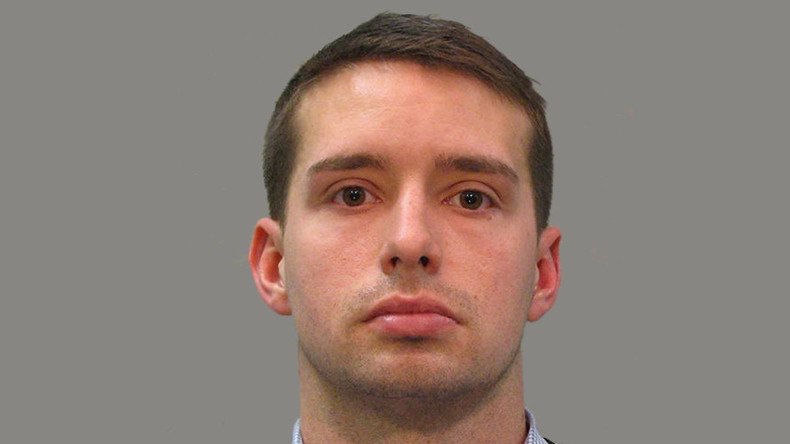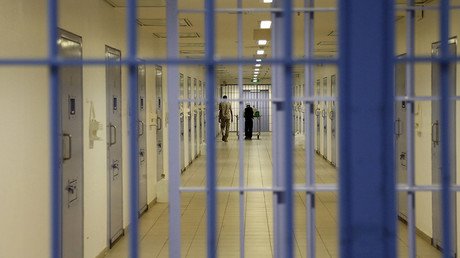Alabama ex-cop acquitted of slamming, paralyzing Indian grandfather

After two previous mistrials, a federal judge has acquitted former police officer Eric Parker, who was charged with violating a Indian citizen's civil rights after throwing him to the ground and partially paralyzing him during a sidewalk stop last year.
In February 2015, Parker, who was responding to a call about a "skinny black guy" walking suspiciously in a Madison, Alabama, neighborhood, encountered non-English speaking Indian national Sureshbhai Patel, who was walking near his son's house. Police dashcam video captured Parker slamming the grandfather, then 57, to the ground, leaving him partially paralyzed.
On Wednesday, US District Judge Madeline Hughes Haikala granted a motion for acquittal filed by Parker's attorneys. The 27-year-old former officer had pleaded not guilty to a federal civil rights felony charge of deprivation of rights under color of law, which includes the right to be free from of "unreasonable force." Parker was later fired by the Madison police department.
Parker's acquittal came after two failed attempts by federal prosecutors to convict him for his swift, physical treatment of Patel, who had just arrived in Alabama to help his son and daughter-in-law care for their newborn baby. Both of Parker's trials concluded with deadlocked juries.
Haikala ruled Wednesday that after "two full and fair chances to obtain a conviction," government prosecutors "will not have another."
"The result in this case is by no means satisfying," Judge Haikala wrote in her 92-page opinion. "Hindsight brings clarity to a calamity. Mr. Patel’s celebrated arrival in this country to begin a new life with his son was interrupted in two tragic minutes. If Mr. Parker or Mr. Patel could take that time back, both would surely do things differently and avoid the events that have forever changed both of their lives.
"However, that injury, standing alone, does not provide the basis for a criminal judgment against Mr. Parker under 18 U.S.C. § 242," Haikala continued. "The law presumes Mr. Parker’s innocence, and the evidence in the record from two trials does not eliminate reasonable doubt as to Mr. Parker’s guilt."
Indian govt ‘extremely disturbed’ about #Alabama police assault of Indian national http://t.co/SWLtxaQ0wjpic.twitter.com/q5UVLp2uoF
— RT America (@RT_America) February 14, 2015In response to the ruling, US attorney Joyce White Vance said the evidence was sufficient for a retrial.
“Where you were born shouldn’t change how you are treated by the police," Vance said, according to WHNT. "Everyone in this country must be able to trust law enforcement. We remain committed to prosecuting those few officers who cross the line and use unreasonable force.”
On February 6, 2015, a neighbor of Patel's son, who lived in the Huntsville suburb of Madison, called police to report a "skinny black guy" who was "just kind of walking around close to the garage," according to AL.com. Police, including Parker, approached the senior Patel on the sidewalk seeking to understand what he was doing. Patel only speaks Gujarati and some Hindi.
“No English. Indian. Walking,” he said, according to his son Chirag’s statement to the local media at the time. Patel's attorneys maintained that he did resist the officers. Dashcam footage of the incident later released by police shows that Patel could not answer the officer's questions, contributing to the tense encounter.
"I did not try to run away but I did go back a couple of steps to show them my house, my house," Patel testified via an interpreter during the second trial. "They put their hands on me and I was just standing and did not move."
Parker slammed Patel to the ground shortly thereafter, leaving Patel unable to walk or grip with his hands, according to testimony by a neurosurgeon who operated on the Indian national. A metal cylinder and plate replaced one vertebra in Patel's neck, Dr. Cheng Tao of Huntsville Hospital told jurors. Patel is not expected to fully recover from the injuries, his lawyer has said.
Parker maintained during both trials that he lost his balance during the takedown of Patel, and that Patel had jerked away from him, allegedly leading Parker to believe "that [Patel] was going for that weapon I presumed he had," he testified in court, according to AL.com.
Alabama Court Declares Second Mistrial in Case of Cop who Beat Indian Man https://t.co/fwrd8CEO3jpic.twitter.com/J7FI5Jkag9
— Democracy Now! (@democracynow) November 5, 2015Haikala said the federal case against Parker ultimately fell short, adding that she did not expect a different outcome from a third trial.
"The Court has viewed the full expanse of evidence concerning the use of force and is left with the firm conviction that the evidence concerning use of force in this case is not adequate to support a unanimous verdict of guilt beyond a reasonable doubt," she wrote.
Even the dashboard video of the encounter was not enough to conclusively prove what happened, Haikala said.
"For all of the Government’s diligent efforts to enhance the dashcam video, the enhanced video fails to capture critical pieces of evidence. The video does not show whether Mr. Patel placed his hands in his pockets as he walked away from Officers Parker and Slaughter."
Ex-cop who paralyzed Indian grandfather pleads not guilty http://t.co/or5NEOC8YPpic.twitter.com/2CDYrQtiHN
— RT America (@RT_America) April 22, 2015Haikala said that Patel's lack of ability to speak English was "very much" disputed, though Parker is on record telling his supervisor that Patel "can't speak a bit of English" during the incident.
"And if Mr. Patel actually told Officers Parker and Slaughter that he was 'walking, walking,' then Officers Slaughter and Parker—indeed any reasonable officer—would have reason to suspect that Mr. Patel was being dishonest and evasive when he repeatedly said 'No English,'” the judge wrote.
Haikala said officers reasonably investigated Patel based on the 911 call reporting a suspicious individual, as police "did not know whether Mr. Patel was casing homes for a future burglary or whether he may have committed a crime before the officers arrived." Patel resisted Parker when the officer attempted to pat him down, the judge said, adding to her position that Parker and his fellow officers acted reasonably.
10 men voted to acquit Alabama cop who knocked out Indian granddad. 2 Black women said no. http://t.co/Lj8h7BL3Nwpic.twitter.com/h9FNf94U5m
— siddhartha mitter (@siddhmi) September 15, 2015Three Madison police officers testified that Parker did not act reasonably. The third officer on the scene during the encounter with Patel said "he appeared to be in his 70s," and posed no obvious threat. Other officers testified that Parker followed his training and did not violate department policy.
Parker also faces a misdemeanor assault charge in Limestone County. The Alabama Attorney General postponed that case pending the federal trial.
Patel’s injuries prompted a strong protest from the Indian government, prompting Alabama governor Robert Bentley to apologize for the “unfortunate use of excessive force.”
“We are extremely disturbed,” spokesman for India’s foreign ministry Syed Akbaruddin said at a briefing in February 2015. “This is a matter of concern for us; and India and the US ‒ as open, pluralist societies ‒ need to address these issues and find ways in a mature manner so that these are aberrations, and are not the norm.”














